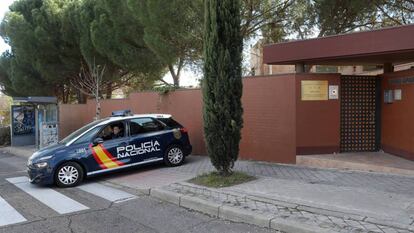Former US marine arrested over attack on North Korean embassy in Madrid
Christopher Ahn, who is allegedly a member of the dissident group Free Joseon, is accused of taking part on the raid on the diplomatic headquarters on February 22

Authorities from the United States have arrested a former marine for allegedly taking part in an attack on the North Korean embassy in Madrid on February 22, according to The Washington Post.
In a statement, Free Joseon apologized to the Spanish authorities “for any inconveniences caused”
The man has been identified as Christopher Ahn, a US national of Korean origin, who is allegedly a member of Free Joseon, a mysterious group that opposes the regime of North Korean leader Kim Jong-un.
The former marine was arrested on Thursday and appeared the following day at a court in Los Angeles. His lawyer, Lee Wolosky, said in a statement that he was “dismayed” that the US Justice Department had decided to “execute warrants against US persons that derive from criminal complaints filed by the North Korean regime.”
But it was not the North Korean regime but rather Spanish Judge José de la Mata, of Spain’s High Court, the Audiencia Nacional, who issued international search-and-arrest warrants for the assailants identified in the raid on the North Korean embassy in Madrid.
De la Mata is in charge of investigating the attack on February 22, in which a group of 10 men are alleged to have broken into the diplomatic headquarters, beat and interrogated embassy staff, and stolen pen drives, two computers, two hard drives (one containing security images) and a cellphone.
In parallel to the Spanish investigation, US federal agents have raided the apartment of Adrian Hong, a US resident with a Mexican passport, who is believed to be the ringleader of the group responsible for the raid.
After attacking the embassy, Hong fled to Lisbon (Portugal), where he boarded a plane to Newark, New Jersey. According to the Spanish investigation, once Hong arrived in New Jersey he contacted the FBI to provide them with the stolen information. However, the FBI did not relay this news to Spain until a few days later. Hong has not yet been arrested.
Spanish Judge José de la Mata has issued an international arrest warrant against the assailants identified
The raid on the North Korean embassy happened just five days before the failed nuclear talks between US President Donald Trump and North Korean leader Kim Jong-un in Vietnam. The purpose of the attack was allegedly to force the commercial attaché, who had been a close collaborator of the former North Korean ambassador to Spain, to defect. A spokesperson from the US State Department said in Washington that the “US government had nothing to do” with the raid on February 22.
Nearly two weeks after EL PAÍS reported that the police and National Intelligence Agency (CNI) had identified at least two of the attackers and found links with the US Central Intelligence Agency, Free Joseon published a press release stating “no other governments [were] involved with or aware of our activity until after the event.” In the statement, the mysterious dissident group confirmed it had shared information with the FBI and maintained they were invited to the embassy to respond “to an urgent situation.” In contrast to the findings from the Spanish investigation, Free Joseon said that “no one was gagged or beaten,” and apologized to the Spanish authorities “for any inconveniences caused.”
English version by Melissa Kitson.
Tu suscripción se está usando en otro dispositivo
¿Quieres añadir otro usuario a tu suscripción?
Si continúas leyendo en este dispositivo, no se podrá leer en el otro.
FlechaTu suscripción se está usando en otro dispositivo y solo puedes acceder a EL PAÍS desde un dispositivo a la vez.
Si quieres compartir tu cuenta, cambia tu suscripción a la modalidad Premium, así podrás añadir otro usuario. Cada uno accederá con su propia cuenta de email, lo que os permitirá personalizar vuestra experiencia en EL PAÍS.
¿Tienes una suscripción de empresa? Accede aquí para contratar más cuentas.
En el caso de no saber quién está usando tu cuenta, te recomendamos cambiar tu contraseña aquí.
Si decides continuar compartiendo tu cuenta, este mensaje se mostrará en tu dispositivo y en el de la otra persona que está usando tu cuenta de forma indefinida, afectando a tu experiencia de lectura. Puedes consultar aquí los términos y condiciones de la suscripción digital.









































